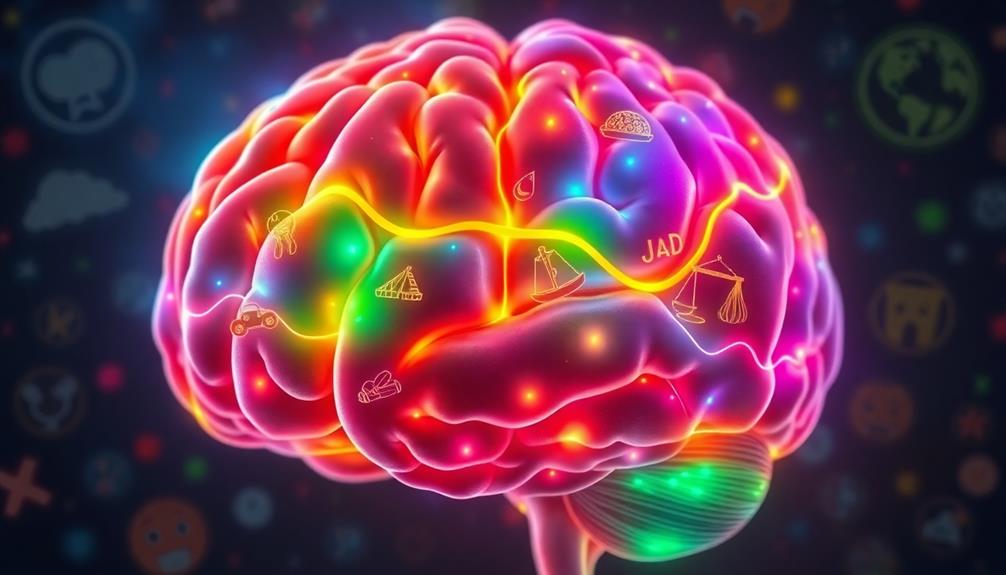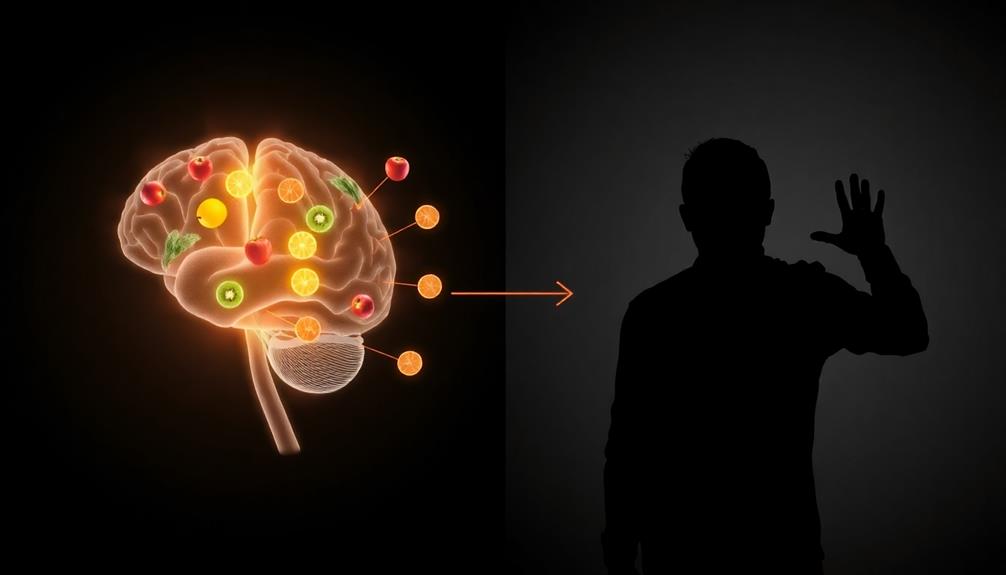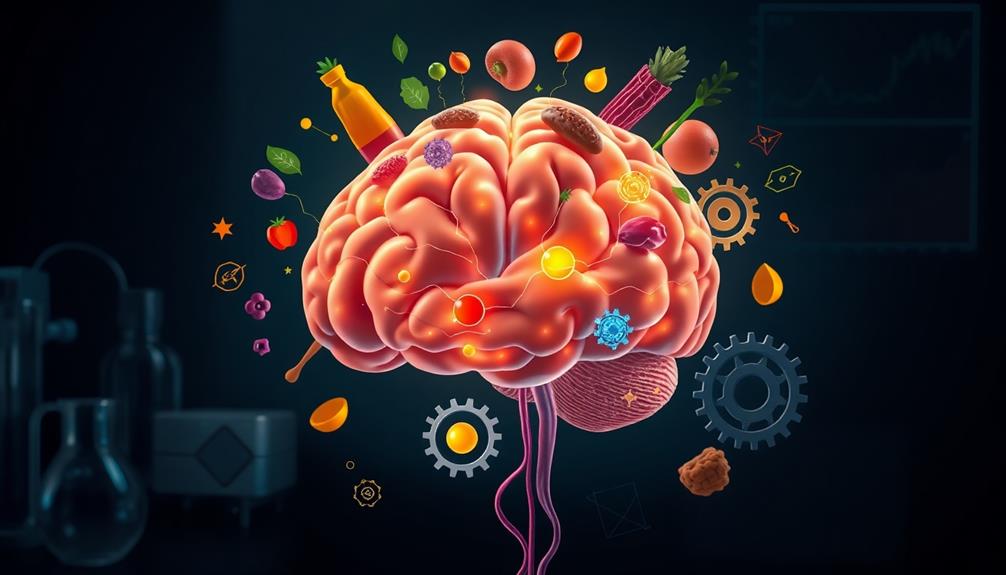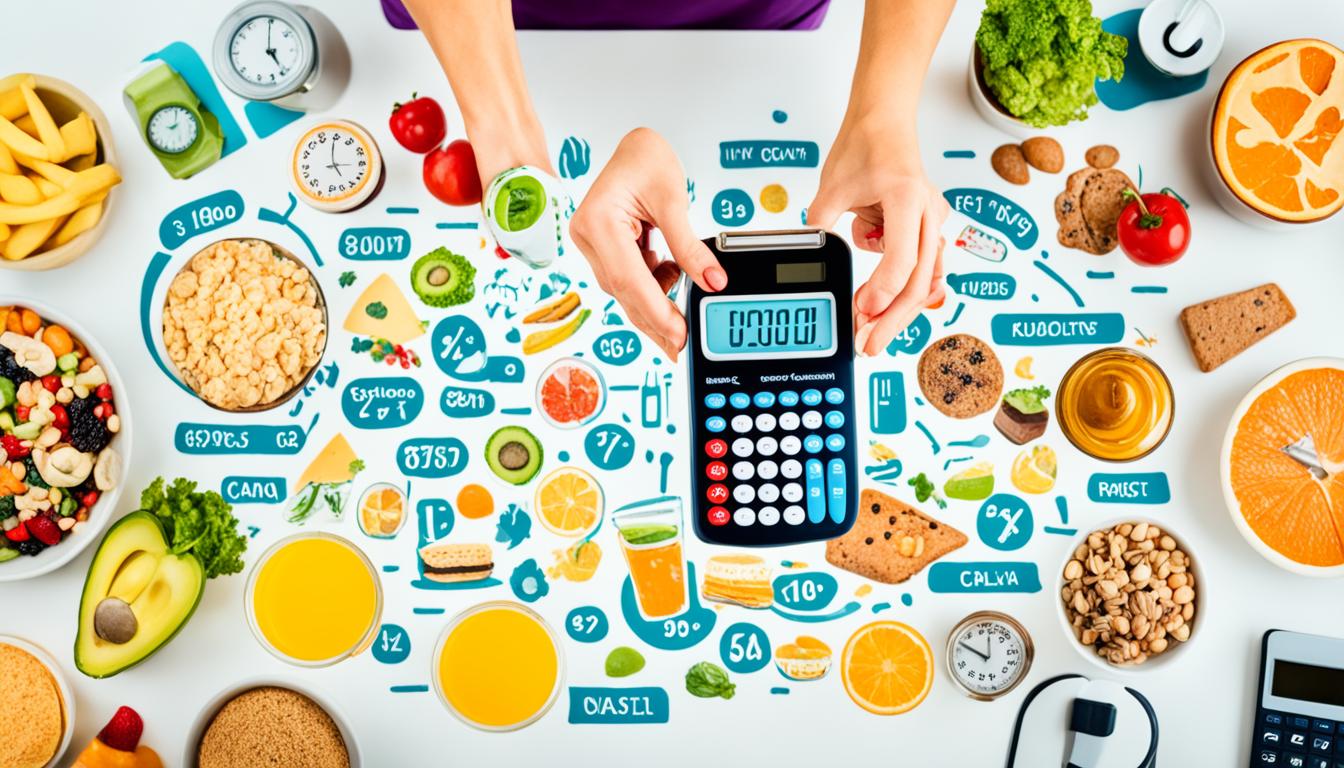Hunger profoundly influences your decision-making and behavior. When you're hungry, impulsive choices take precedence over long-term thinking. Ghrelin, the hunger hormone, drives you toward immediate rewards, making you crave comfort foods and less likely to settle for healthier options. This shift often leads to frustrating decisions, as your emotional state may worsen, heightening irritability and aggression. You might also find yourself prioritizing quick snacks over balanced meals. Understanding these changes could help you manage your choices better, leading to healthier habits and smarter decisions in the future. Explore more insights on how hunger shapes your daily life.
Key Takeaways
- Hunger increases impulsivity, leading individuals to favor immediate rewards over long-term benefits in decision-making.
- Elevated ghrelin levels during hunger reduce inhibition, resulting in poorer choices regarding food and other rewards.
- Emotional states like irritability and stress heighten during hunger, further impairing judgment and decision-making quality.
- Hungry individuals are more likely to engage in risky behaviors and make quick, less calculated choices across various contexts.
- Regular meal planning and mindful eating can mitigate the negative effects of hunger on decision-making and behavior.
The Science of Hunger Hormones

Hunger hormones, especially ghrelin, greatly impact how your brain makes decisions about food. Ghrelin, often dubbed the "hunger hormone," crosses the blood-brain barrier, influencing neural activity in key areas like the ventral hippocampus. This region is essential for contextual learning related to your eating choices and can even affect your cravings for specific dishes, such as Mushroom Masala.
When ghrelin levels spike, you experience increased neural activity that encourages eating behavior, particularly in hungry states.
Research shows that high ghrelin levels correlate with reduced neural activity in the hippocampus, which can lead you to initiate feeding more impulsively. The ventral hippocampus connects to the nucleus accumbens, an area that typically inhibits eating initiation, suggesting that hunger cues activate specific ghrelin-sensitive circuits in your brain.
This is where decision making comes into play; when you're hungry, your brain prioritizes immediate rewards, reinforcing impulsive behavior over more considered, long-term choices.
Neural Mechanisms Behind Decision-Making

The dynamics of decision-making are deeply intertwined with the neurological responses triggered by hunger hormones like ghrelin. When you feel hungry, ghrelin crosses the blood-brain barrier, influencing neural activity in your ventral hippocampus. This region is vital for making decisions about food intake and plays a significant role in how you assess risks and rewards.
Additionally, the culinary influences and diverse flavors in Brazilian cuisine, such as the rich traditional dishes like Caldeirada and Caruru, may also impact your food choices and cravings.
Here are three key ways hunger impacts your decision-making:
- Reduced Neural Activity: Increased ghrelin levels correlate with decreased neural activity in the ventral hippocampus, which may lead to less inhibition when it comes to eating behavior.
- Impulsive Learning: Hunger signals can enhance impulsive, model-free learning strategies, affecting how quickly you make decisions without weighing all options.
- Contextual Memory: The ventral hippocampus is essential for contextual learning; specific neuron subpopulations help regulate your feeding behavior based on your hunger state.
Understanding these neural mechanisms helps clarify why hunger not only influences your food-related choices but also affects overall cognitive functions. As you navigate decisions, remember that hunger can shift your perspective, prompting quicker, less calculated choices.
Behavioral Changes in Hungry Individuals

When you're hungry, you might notice a shift in your decision-making. Impulsive choices become more tempting, and you may find yourself leaning towards short-term rewards instead of considering long-term outcomes.
This heightened risk-taking can greatly impact not just your food choices but other areas of your life too. For instance, you might reach for comfort foods like satisfying fried pork chops, prioritizing immediate gratification over more nutritious options.
Impulsive Choices Increase
Impulsivity often takes center stage in decision-making processes for those feeling hungry. When hunger strikes, you might find yourself making choices that prioritize immediate gratification over long-term benefits. For instance, the craving for a rich dish like Red-Braised Pork Belly could lead to a quick, impulsive decision to indulge rather than sticking to a healthier meal plan.
Research shows that hunger not only boosts impulsivity but also shifts your preferences in decision-making. Here are three key ways hunger influences your choices:
- Short-term Rewards: You tend to favor immediate rewards, often opting for quick, impulsive decisions that satisfy your hunger right away.
- Model-free Control: Hungry individuals rely more on reflexive decision-making, repeating choices that have been rewarded in the past, rather than considering long-term outcomes.
- Wider Impact: Hunger can skew your perception of value, affecting not just food choices but also how you evaluate non-food rewards, leading to impulsive behavior across various contexts.
In essence, when you're hungry, your decisions become less about strategy and more about seizing immediate opportunities. This shift highlights the powerful connection between hunger and impulsive behavior, steering you toward choices that may not align with your best interests.
Risk-Taking Behavior Heightens
Hunger heightens your inclination to take risks, pushing you toward choices that may seem unwise in a more satiated state. When you're hungry, your decision-making shifts dramatically, often leading to impulsivity that affects not just food-related choices but also your financial decisions and other areas of life.
Research shows that hungry individuals are more likely to engage in risky behaviors, reflecting an instinctual drive for immediate rewards. This is similar to how the desire for sweet treats like Kue Putu can override rational choices during moments of hunger.
This heightened risk-taking isn't just limited to food; studies reveal that when you're low on sustenance, you might take greater chances in various contexts. For instance, hungry participants in experiments show a clear tendency to repeat rewarded choices, even extending a 25% spillover effect on non-food related rewards.
This means that your decision-making quality can suffer as hunger narrows your focus, leading to impatience and a preference for short-term gains over long-term benefits.
As you experience hunger, your ability to assess risks diminishes. This shift emphasizes how crucial it's to recognize the impact of hunger on your behavior, especially in moments requiring thoughtful decision-making.
Short-Term Reward Preference
A strong craving for immediate rewards often emerges in hungry individuals, leading them to choose short-term gains over long-term benefits. When you're feeling hunger, your decision-making can shift dramatically, increasing your preference for impulsive choices.
This can be particularly noticeable when considering food options; for example, the temptation to quickly whip up a Turkey Sandwich (For Leftovers) may overshadow healthier, more balanced meal plans.
Here are three key effects of hunger on short-term reward preference:
- Immediate Gratification: Hungry people are more likely to opt for quick rewards, like grabbing a snack, rather than waiting for something better, like a full meal.
- Reduced Patience: Research shows that while satiated individuals might wait up to 35 days for a reward, hungry ones will only wait about 3 days, showcasing a stark urgency.
- Impulsive Choices: Hunger enhances impulsivity, making it easier to make rash decisions that prioritize immediate satisfaction over long-term goals.
This shift from long-term to short-term rewards complicates rational decision-making, particularly in financial choices and relationships.
Impacts on Short-Term Versus Long-Term Choices

When you're feeling hungry, your decision-making can take a sharp turn towards the immediate rather than the beneficial. Hunger heightens your impulsivity, making short-term rewards seem far more appealing than long-term benefits.
For example, when faced with hunger, you might be tempted to grab a quick snack like Khanom Tan instead of preparing a balanced meal. Research shows that when you're in a hungry state, you might show a 25% preference shift, not just in food choices but also in other decisions, like finances. Faced with hunger, you may choose quick snacks over healthier meals that require patience for better rewards.
This impulsive behavior can lead you to make riskier financial choices too. Instead of considering future stability, you prioritize immediate monetary gains. As you rely more on reflexive responses, the cognitive strategies that usually guide your decision-making take a backseat.
This shift can lead to poorer long-term outcomes, as you neglect options that promise greater benefits down the line. In essence, hunger skews your choices towards the short-term, pushing aside the more thoughtful, long-term considerations that usually help you achieve better results in both eating and spending.
It's essential to recognize this pattern to make wiser decisions when hunger strikes.
Hunger's Influence on Emotional States

When you're hungry, your mood can take a significant hit, making you feel more irritable or stressed.
This heightened emotional state often leads to impulsive decisions, as you might prioritize immediate satisfaction over long-term goals.
For instance, the craving for comfort food can lead you to indulge in unhealthy options instead of considering more nutritious choices like a Nettle and Potato Soup, which offers a creamy texture and is rich in vitamins.
Understanding how hunger affects your emotions can help you recognize the role it plays in your decision-making process.
Hunger and Mood Regulation
Experiencing hunger can considerably alter your emotional state, often leading to increased irritability and impulsive behavior. When you're hungry, your mood may take a nosedive, affecting how you make decisions. For example, when planning a gathering, the stress of hunger might steer you towards unhealthy snack choices, rather than enjoyable and festive options like Graveyard Taco Dip, which can be both fun and satisfying.
Here are three key ways hunger influences your mood:
- Increased Irritability: Low blood sugar levels can spike feelings of frustration and anger, making you more reactive to situations.
- Impulsive Behavior: Hunger drives you to prioritize immediate rewards, like reaching for a snack, over long-term benefits, which can lead to regrettable choices.
- Cognitive Impairment: Your ability to assess risks and evaluate potential outcomes suffers when you're hungry, complicating your decision-making process.
This emotional rollercoaster can lead to emotional eating, as many turn to food for comfort, complicating dietary choices and potentially resulting in unhealthy eating habits.
Over time, chronic hunger can contribute to anxiety and stress, further diminishing your mental health. By understanding how hunger impacts your mood, you can make more mindful choices that enhance your emotional well-being and better your decision-making abilities.
Impulsivity and Emotional Responses
Feeling hungry can trigger a cascade of emotional responses that heighten impulsivity and skew decision-making. When you're low on energy, irritability and aggression often rise, impacting how you interact with others. Your brain, focused on immediate needs, can push you toward short-term rewards, leading to poor choices.
| Emotional Response | Effect on Decision-Making |
|---|---|
| Increased Irritability | Heightened impulsivity |
| Short-Term Focus | Maladaptive eating behaviors |
| Survival Instincts | Compromised planning |
| Aggressive Reactions | Impaired judgments |
| Reduced Psychological Resilience | Emotion-driven decisions |
As hunger pangs set in, your ability to weigh long-term benefits decreases. You may prioritize instant gratification over rational planning, making impulsive decisions that could lead to overconsumption. This pattern reflects a survival mechanism, where your body pushes for immediate satisfaction rather than logical assessments. Understanding this connection between hunger and emotional responses can help you recognize when your decisions might be influenced by your physical state, allowing you to make more informed choices.
Stress and Eating Behavior
Hunger often ramps up stress levels, influencing your emotional state and eating behavior. When you experience hunger, your body can trigger heightened irritability and stress, negatively impacting your decision-making. This can lead to choices that prioritize immediate gratification over long-term benefits.
For instance, when faced with hunger, you might be tempted to indulge in comfort foods like Chilaquiles, which can offer a quick but not always healthy solution.
Here are three ways hunger affects your emotional responses:
- Increased Aggression: Low blood sugar levels can correlate with aggressive behavior, pushing you to make impulsive choices.
- Emotional Eating: Chronic hunger often drives you to seek comfort in food, leading to unhealthy dietary decisions steeped in emotional responses.
- Diminished Cognitive Function: Prolonged hunger can impair your psychological resilience, reducing your ability to think clearly and make sound judgments.
This "hunger games" phenomenon shifts your focus from rational thought to basic survival, emphasizing your immediate needs.
As stress mounts, you may find yourself falling into patterns of emotional eating, complicating your relationship with food. Recognizing how hunger intertwines with stress can help you make better decisions and manage your emotional state more effectively.
Implications for Eating Disorders

Elevated levels of the hunger hormone ghrelin greatly impact decision-making in individuals with eating disorders. This disruption enhances impulsivity, making it harder for you to resist food-related cues.
If you're struggling with anorexia or bulimia, the ventral hippocampus—sensitive to ghrelin—plays a significant role in regulating your eating behaviors. When it's not functioning properly, you may develop maladaptive eating patterns that complicate your recovery.
Hunger can skew your preferences, leading you to prioritize immediate rewards over long-term health goals. This tendency can create substantial hurdles as you try to navigate the complexities of recovery from eating disorders.
Understanding how hunger hormones influence your decision-making can inform better treatment strategies tailored to your needs.
Moreover, the link between hunger signaling and mental health suggests that addressing hunger-related cognitive distortions is essential for both prevention and treatment.
Decision-Making Across Different Contexts

The influence of hunger on decision-making stretches beyond food-related choices, affecting various aspects of your life. When you're hungry, your brain shifts its focus, leading to impulsivity and a preference for immediate rewards.
Here are three ways hunger impacts your decision-making:
- Financial Choices: Hungry individuals often take greater risks with money, showing a tendency to prioritize short-term gains over long-term stability.
- Social Dynamics: In group settings, hunger can steer conversations and choices toward food, which may create a collective impulsivity that influences everyone's decisions.
- Mental Accounting: Hunger skews your ability to assess rewards accurately, causing you to undervalue delayed gratification and lean towards options that satisfy immediate cravings.
These shifts in decision-making highlight how hunger affects not just what you eat, but also how you approach various life choices.
As hunger drives you toward impulsive decisions, it's essential to recognize its influence in every context—whether it's finances, social situations, or personal goals. By understanding these patterns, you can be more mindful of how hunger impacts your choices and aim for better decision-making overall.
Strategies to Mitigate Impulsive Choices

Recognizing how hunger affects decision-making is the first step towards making better choices. To mitigate impulsive choices, start with regular meal planning. This helps stabilize your blood sugar levels, which is essential for maintaining cognitive function and reducing those impulsive food decisions.
Next, practice mindful eating. This encourages you to tune into your hunger cues, promoting healthier choices and minimizing impulse eating.
Keeping healthy snacks readily available is another effective strategy. When you have nutritious options on hand, you can prevent significant dips in energy that lead to poor decision-making.
Additionally, educating yourself on nutrition empowers you to make informed dietary decisions, fostering healthier eating habits and reducing the impact of hunger on impulsive choices.
Don't forget about stress management techniques. Implementing methods like deep breathing or meditation can help you manage emotional responses tied to hunger. This way, you're more likely to make rational decisions rather than succumbing to decisions driven by hunger-induced irritability.
Future Research Directions in Neuroscience

As researchers dig deeper into the connections between hunger and decision-making, exciting avenues for future study are emerging. This ongoing research could reshape our understanding of how internal states influence our choices. Here are three compelling directions for future exploration:
- Ghrelin's Role: Investigating how ghrelin and its receptors in the hippocampus affect decision-making processes related to eating behaviors could reveal significant insights into cognitive functions tied to hunger.
- Stress and Thirst: Examining whether the neural mechanisms governing hunger also apply to stress and thirst-related behaviors may broaden our understanding of how these internal states impact decision-making and impulsivity.
- Learning and Memory: Evaluating how hunger influences learning and memory tasks could uncover the nuances of hunger-induced state changes on both food-related and non-food-related choices.
These studies won't only deepen your comprehension of hunger's effects but could also lead to targeted interventions.
Public Health Considerations and Awareness

When you're hungry, your health choices can take a hit, often leading to impulsive decisions that favor unhealthy options.
This impulsivity not only affects what you eat but also makes you vulnerable to marketing tactics that exploit these cravings. This impulsivity not only affects what you eat but also makes you vulnerable to marketing tactics that exploit these cravings. The neuroscience behind food cravings reveals that certain hyper-palatable foods can hijack your brain’s reward system, making it even harder to resist temptation. Advertisers leverage this knowledge, using vivid imagery and sensory cues to trigger these neural responses and reinforce the cycle of consumption.
It's essential to recognize how hunger influences your decisions and to advocate for public health measures that promote access to nutritious food and mindful eating habits.
Impacts on Health Choices
Hunger plays a critical role in shaping your health choices, often steering you toward immediate gratification rather than long-term wellness. When you're hungry, your decision-making can become impulsive, leading to poor health choices.
Here are three key impacts of hunger on your health:
- Unhealthy Snacking: You're more likely to grab quick, unhealthy snacks instead of preparing balanced meals, as hunger amplifies the reward value of food.
- Emotional Reactions: Experiencing hunger can increase aggression and irritability, impairing your judgment and prompting you to make impulsive health decisions.
- Social Influence: In social settings, hunger can distort your choices, making you more susceptible to collectively unhealthy food options, especially when surrounded by others.
Understanding these impacts can help you develop strategies for better health choices.
Public health initiatives can focus on managing hunger through regular meal planning, which may reduce the risk of obesity and eating disorders.
Hunger and Impulsive Decisions
In the throes of hunger, your ability to make thoughtful decisions can wane considerably. You may find yourself prioritizing immediate food rewards over long-term benefits, leading to impulsive choices that aren't in your best interest. Research shows that when you're hungry, your preference for instant gratification skyrockets. Instead of waiting 35 days for a reward, you might only be willing to wait just 3 days, drastically shortening your decision-making window.
Hunger doesn't just affect your food choices; it heightens emotional states like irritability and aggression, further clouding your judgment in social situations. When you're hungry, you might perceive the value of food-related options as far more significant than other needs, which can make you vulnerable to unhealthy decisions.
Public health strategies that promote regular meal planning and mindful eating can help combat these negative effects. By being aware of how hunger impacts your impulsivity, you can take steps to mitigate its influence on your decision-making.
This awareness can empower you to make healthier, more deliberate choices, reducing the likelihood of succumbing to impulsive decisions driven by hunger.
Marketing Exploitation Risks
The link between hunger and decision-making creates a ripe environment for marketers to exploit impulsive behavior. When you're hungry, your decision-making quality drops, making you more likely to choose quick food options over healthier ones.
Here's how marketing exploitation plays out:
- Targeting Unhealthy Choices: Marketers know hunger drives you to prefer unhealthy, high-calorie foods, often promoting these products as quick fixes.
- Promotion Sensitivity: When hungry, you're more susceptible to advertisements and promotions, making you act on impulse rather than logic.
- Skewed Value Perception: Hunger can distort your perception of value, causing you to prioritize immediate gratification over long-term health benefits.
Awareness of these tactics is essential. By recognizing how hunger influences your decision-making, you can make more informed choices and resist the lure of marketing exploitation.
Mindful eating can empower you to prioritize nutrition over impulse, helping you avoid the pitfalls of food marketing that prey on impulsive consumers.
Frequently Asked Questions
How Does Being Hungry Affect Decision-Making?
When you're hungry, your decision-making shifts. You might prioritize immediate rewards, act impulsively, or struggle to plan ahead. Irritability can cloud your judgment, making choices less rational and more influenced by your cravings.
How Does Hunger Affect Our Thinking and Behaviour?
Hunger impacts your thinking and behavior by clouding judgment and increasing impulsivity. You might prioritize immediate rewards, feel irritable, and make choices driven by short-term satisfaction, often neglecting long-term consequences or healthier options.
How Does Food Affect Decision-Making?
Food greatly influences your decision-making by altering your focus and priorities. When you're hungry, you tend to choose immediate food rewards over other options, often neglecting long-term consequences in favor of short-term satisfaction.
What Role Does Hunger Have on Motivating Behavior?
When your stomach growls like a restless child, it nudges you toward immediate actions. You chase quick satisfaction, prioritizing instant rewards over long-term gains, often leading to impulsive choices that shape your daily life.
Conclusion
In the intricate dance between hunger and decision-making, you find yourself swayed by both instinct and impulse. Awareness of how hunger shapes your choices can empower you to navigate life's complexities more wisely. As you endeavor for balance, remember that hunger's grip can cloud your judgment, turning even the simplest decisions into intimidating challenges. Embracing this knowledge not only sharpens your decision-making skills but also fosters a deeper understanding of yourself and your behaviors in the face of hunger.









